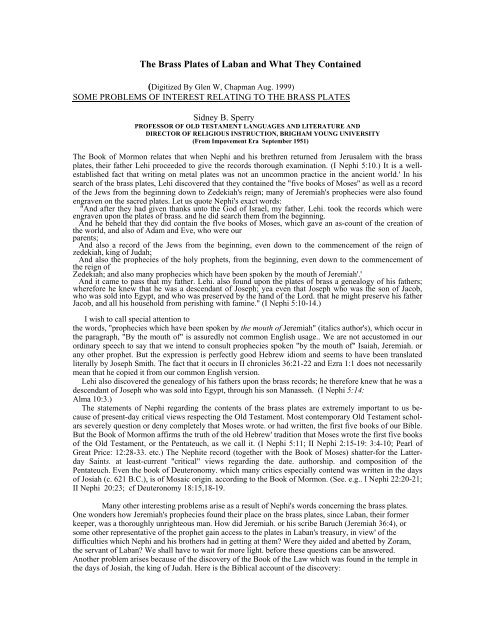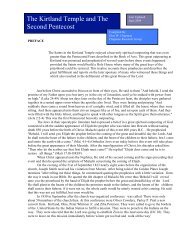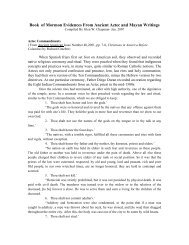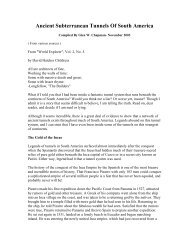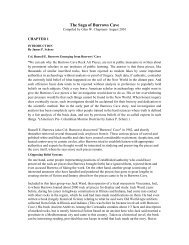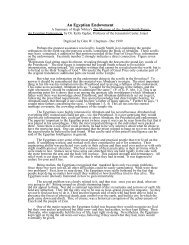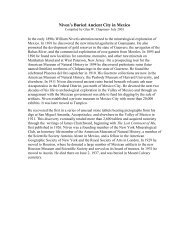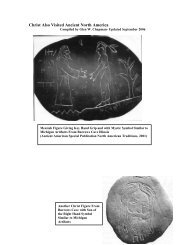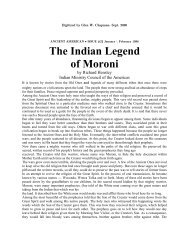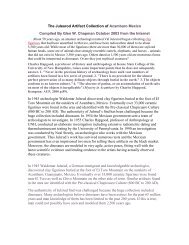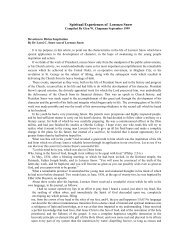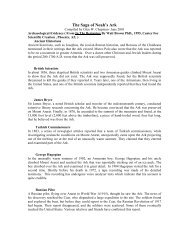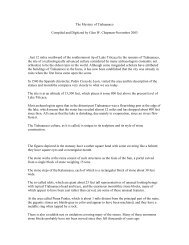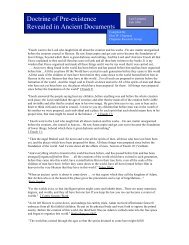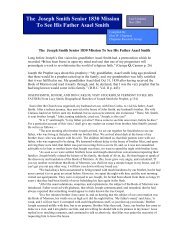The Brass Plates of Laban - Chapmanresearch
The Brass Plates of Laban - Chapmanresearch
The Brass Plates of Laban - Chapmanresearch
- No tags were found...
Create successful ePaper yourself
Turn your PDF publications into a flip-book with our unique Google optimized e-Paper software.
<strong>The</strong> <strong>Brass</strong> <strong>Plates</strong> <strong>of</strong> <strong>Laban</strong> and What <strong>The</strong>y Contained(Digitized By Glen W, Chapman Aug. 1999)SOME PROBLEMS OF INTEREST RELATING TO THE BRASS PLATESSidney B. SperryPROFESSOR OF OLD TESTAMENT LANGUAGES AND LITERATURE ANDDIRECTOR OF RELIGIOUS INSTRUCTION, BRIGHAM YOUNG UNIVERSITY(From Impovement Era September 1951)<strong>The</strong> Book <strong>of</strong> Mormon relates that when Nephi and his brethren returned from Jerusalem with the brassplates, their father Lehi proceeded to give the records thorough examination. (I Nephi 5:10.) It is a wellestablishedfact that writing on metal plates was not an uncommon practice in the ancient world.' In hissearch <strong>of</strong> the brass plates, Lehi discovered that they contained the "five books <strong>of</strong> Moses" as well as a record<strong>of</strong> the Jews from the beginning down to Zedekiah's reign; many <strong>of</strong> Jeremiah's prophecies were also foundengraven on the sacred plates. Let us quote Nephi's exact words:"And after they had given thanks unto the God <strong>of</strong> Israel, my father. Lehi. took the records which wereengraven upon the plates <strong>of</strong> brass. and he did search them from the beginning.And he beheld that they did contain the flve books <strong>of</strong> Moses, which gave an as-count <strong>of</strong> the creation <strong>of</strong>the world, and also <strong>of</strong> Adam and Eve, who were ourparents;And also a record <strong>of</strong> the Jews from the beginning, even down to the commencement <strong>of</strong> the reign <strong>of</strong>zedekiah, king <strong>of</strong> Judah;And also the prophecies <strong>of</strong> the holy prophets, from the beginning, even down to the commencement <strong>of</strong>the reign <strong>of</strong>Zedekiah; and also many prophecies which have been spoken by the mouth <strong>of</strong> Jeremiah'.'And it came to pass that my father. Lehi. also found upon the plates <strong>of</strong> brass a genealogy <strong>of</strong> his fathers;wherefore he knew that he was a descendant <strong>of</strong> Joseph; yea even that Joseph who was the son <strong>of</strong> Jacob,who was sold into Egypt, and who was preserved by the hand <strong>of</strong> the Lord. that he might preserve his fatherJacob, and all his household from perishing with famine." (I Nephi 5:10-14.)I wish to call special attention tothe words, "prophecies which have been spoken by the mouth <strong>of</strong> Jeremiah" (italics author's), which occur inthe paragraph, "By the mouth <strong>of</strong>" is assuredly not common English usage.. We are not accustomed in ourordinary speech to say that we intend to consult prophecies spoken "by the mouth <strong>of</strong>" Isaiah, Jeremiah. orany other prophet. But the expression is perfectly good Hebrew idiom and seems to have been translatedliterally by Joseph Smith. <strong>The</strong> fact that it occurs in II chronicles 36:21-22 and Ezra 1:1 does not necessarilymean that he copied it from our common English version.Lehi also discovered the genealogy <strong>of</strong> his fathers upon the brass records; he therefore knew that he was adescendant <strong>of</strong> Joseph who was sold into Egypt, through his son Manasseh. (I Nephi 5:14:Alma 10:3.)<strong>The</strong> statements <strong>of</strong> Nephi regarding the contents <strong>of</strong> the brass plates are extremely important to us because<strong>of</strong> present-day critical views respecting the Old Testament. Most contemporary Old Testament scholarsseverely question or deny completely that Moses wrote. or had written, the first five books <strong>of</strong> our Bible.But the Book <strong>of</strong> Mormon affirms the truth <strong>of</strong> the old Hebrew' tradition that Moses wrote the first five books<strong>of</strong> the Old Testament, or the Pentateuch, as we call it. (I Nephi 5:11; II Nephi 2:15-19: 3:4-10; Pearl <strong>of</strong>Great Price: 12:28-33. etc.) <strong>The</strong> Nephite record (together with the Book <strong>of</strong> Moses) shatter-for the LatterdaySaints. at least-current "critical" views regarding the date. authorship. and composition <strong>of</strong> thePentateuch. Even the book <strong>of</strong> Deuteronomy. which many critics especially contend was written in the days<strong>of</strong> Josiah (c. 621 B.C.), is <strong>of</strong> Mosaic origin. according to the Book <strong>of</strong> Mormon. (See. e.g.. I Nephi 22:20-21;II Nephi 20:23; cf Deuteronomy 18:15,18-19.Many other interesting problems arise as a result <strong>of</strong> Nephi's words concerning the brass plates.One wonders how Jeremiah's prophecies found their place on the brass plates, since <strong>Laban</strong>, their formerkeeper, was a thoroughly unrighteous man. How did Jeremiah. or his scribe Baruch (Jeremiah 36:4), orsome other representative <strong>of</strong> the prophet gain access to the plates in <strong>Laban</strong>'s treasury, in view' <strong>of</strong> thedifficulties which Nephi and his brothers had in getting at them? Were they aided and abetted by Zoram,the servant <strong>of</strong> <strong>Laban</strong>? We shall have to wait for more light. before these questions can be answered.Another problem arises because <strong>of</strong> the discovery <strong>of</strong> the Book <strong>of</strong> the Law which was found in the temple inthe days <strong>of</strong> Josiah, the king <strong>of</strong> Judah. Here is the Biblical account <strong>of</strong> the discovery:
And it came to pass in the eighteenth year <strong>of</strong> king Josiah (c, 621 B.C.3. that the king sent Shaphan the son<strong>of</strong> the son <strong>of</strong> Meshullam. the scribe. to the house <strong>of</strong> the Lord saying:"Go up to Hilkiah the high priest. that he may sum the money which is brought into the house <strong>of</strong> the Lordwhich the keepers <strong>of</strong> the door have gathered <strong>of</strong> the people: and let them deliver it into the hand <strong>of</strong> theworkmen that have the oversight <strong>of</strong> the house <strong>of</strong> the Lard: and let them give it to the workmen that are inthe house <strong>of</strong> the Lord to repair the breaches <strong>of</strong> the house, unto the carpenters, and to the builders. and to themasons; and for buying timber and hewn stone to repair the house."Howbeit there was no reckoning made with them <strong>of</strong> the money that was delivered into their hand; for theydealt faithfully. And Hilkiah the high priest said unto Shaphan the scribe: 'I have found the book <strong>of</strong> the Lawin the house <strong>of</strong> the Lord" And Hukiah delivered the book to Shaphan, and he read it, And Shaphan thescribe came to the king, and brought back word unto the king, and said: the servants have Poured out themoney that was found in the house. and have delivered it into the hand <strong>of</strong> the workmen that have theoversight <strong>of</strong> the house <strong>of</strong> the Lord" And Shaphan the scibe told the king, saying: "Hilkiab the priest hathdelivered me a book", And Shaphan read it before the king. And it came to pass, when the king had heardthe words <strong>of</strong> the book <strong>of</strong> the Law, that he rent his cloths And the king commanded Hilkiab the priest. andAhilcam the son <strong>of</strong> Shaphan, and Achbor the son <strong>of</strong> Micajah, and Shaphan the scibe. and Auhiah the king'sservant. saying:"Go ye. inquire <strong>of</strong> the Lard for me, and for the people, and for all Judah, concerning the words <strong>of</strong> thisbook that is found: for great is the wrath <strong>of</strong> the Lard that is kindled against us, because our fathers have nothearkened unto the words <strong>of</strong> this hook, to do according unto all that which is written concerning us(II Kings 22:3-13)As a result <strong>of</strong> finding this book, King Josiah instituted a great reform. (See II Kings 22:14-23: 25.)Now the question arises, what was the nature <strong>of</strong> the Book <strong>of</strong> the Law, to which Josiah and his fathers hadfailed to heed? Many conservative scholars have held that it included the entire Pentateuch, while most <strong>of</strong>the critical scholars have held it to be the book <strong>of</strong> Deuteronomy. In view' <strong>of</strong> the fact that King Josiah'sreforms included in their scope a wider legislation than that found in Deuteronomy, ft would seem probablethat the book found in the temple included not only Deuteronomy but others, if not ail. <strong>of</strong> the books <strong>of</strong> thePentateuch. As students <strong>of</strong> the Book <strong>of</strong> Mormon we ask ourselves, how does it happen that the Jews in thedays <strong>of</strong> Josiah-at least up to 621 B. C. were without the Book <strong>of</strong> the Law, inasmuch as the brass platescontaining it were in the hands <strong>of</strong> <strong>Laban</strong> or one <strong>of</strong> his predecessors? Are we to suppose that the keepers <strong>of</strong>the brass plates deliberately withheld the Book <strong>of</strong> the Law from the Jews? <strong>The</strong>y must have known theywere without it. Such an action would seem strange because certain individuals were allowed access to theplates in order to write the prophecies <strong>of</strong> Jeremiah. Perhaps the Book <strong>of</strong> the Law was some other book thanwe have supposed, but that seems quite unlikely. At present, we are unable to answer, with any certainty,the questions I have asked. But they are interesting questions, and someday we shall probably obtain theanswers to them.Nephi makes another statement about the brass plates that arrests our attention. He says, "And<strong>Laban</strong> also was a descendant <strong>of</strong> Joseph, wherefore he and his fathers had kept the records." (I Nephi 5:16;italics author's.) <strong>The</strong>se words seem to indicate that the recording <strong>of</strong> the Hebrew' scriptures on the brassplates had begun many generations before <strong>Laban</strong>'s time, how many we know not. Furthermore, it would bekept in the senior tribe <strong>of</strong> Israel, that is to say, in the tribe <strong>of</strong> Ephraim. (See Genesis 48:5, 13-20; IChronicles 5:1-2.) <strong>Laban</strong> may well have been a descendant <strong>of</strong> Joseph through Ephraim. We may properlyask ourselves how it happened that <strong>Laban</strong>-and Lehi's family. for that matter. inasmuch as they weredescendants <strong>of</strong> Joseph through Manasseh-happened to be living in Jerusalem. <strong>The</strong> tribes <strong>of</strong> Ephraim andManasseh, as the reader is well aware, had been allied generations before with the northern kingdom <strong>of</strong>Israel, not with Judah in the south. A reason-able answer to our question would be this: <strong>The</strong> northernkingdom <strong>of</strong> Israel fell to the Assyrians when its capital <strong>of</strong> Samaria capitulated to Sargon II in 721 B.C. <strong>The</strong>forebears <strong>of</strong> laban may well have fled to Jerusalem to prevent the sacred records from falling into alienhands. Lehi's grandfather or great-grandfather may have left his northern home for Jerusalem in order toprevent his children from intermarrying or making religious compromises with the foreigners brought intothe land by the Assyrians. Such a course would not be unreasonable on the part <strong>of</strong> many devout families.If the brass plates had been kept by <strong>Laban</strong>'s ancestors in the tribe <strong>of</strong> Ephraim as early as the unitedkingdom under Saul, David, and Solomon, it would be <strong>of</strong> great interest to know their history and that <strong>of</strong>any other sacred records subsequent to the division which took place after Solomon's death; it will beremembered that the northern confederation <strong>of</strong> tribes followed Jeroboam and the southern kingdom <strong>of</strong>Judah remained under Rehoboam. (I Kings 11:29; 12:24.) What happened to the keeping <strong>of</strong> sacred recordswhen the Israelites became sharply divided on political grounds so much so that the two nations wereenemies? We remember the religious effects <strong>of</strong> the American Civil War upon the North and South when weask the question. <strong>The</strong> prophets in both nations probably paid little attention to the political lines <strong>of</strong> division,but it is improbable that all <strong>of</strong> them had their words recorded in the scriptures <strong>of</strong> both nations. From the.
time <strong>of</strong> the division until the fall <strong>of</strong> the northern kingdom in 721 B. C.. the brass plates may well have beenthe <strong>of</strong>ficial scripture <strong>of</strong> the Ten Tribes. It is probable that some prophets wrote on these plates whosewritings may not have been recorded on the records kept in Judah. Were Zenos. Zenock, Neum, and Ezias(I Nephi 19:10; Helaman 8:20) among them? <strong>The</strong>y were all Hebrew prophets known to the Nephites. buttheir names do not appear in our current Old Testament, It is also possible that the writings <strong>of</strong> someprophets in Judah were not placed on the brass plates during the period under consideration, but <strong>of</strong> this wehave no way <strong>of</strong> knowing. But after the fall <strong>of</strong> Samaria, in 721 B. C. it is very probable that most Jewishprophetical writings were engraved on the brass plates. assuming, <strong>of</strong> course, that <strong>Laban</strong>'s immediateforebears came to Jerusalem as we have already conjectured. It is a fact <strong>of</strong> considerable importance inbiblical studies that the Book <strong>of</strong> Mormon indicates the presence on the brass plates <strong>of</strong> more scripture thanthat contained in our Old and New Testaments put together. (I Nephi 13:23-26.) Considering the fact that.these plates recorded Hebrew scripture written only before the year 600 B. C.. we have ample testimony tothe loss <strong>of</strong> much scripture between that date and the present time.When Lehi had searched the brass plates, he was filled with the Spirit, and began to prophesy tothe effect that the day would come when they should be made known unto all kindreds, tongues. and peoplewho were <strong>of</strong> his seed. (I Nephi 5:17-18.) Moreover, he prophesied that the brass plates should never perishor be dimmed by time. (I Nephi 5:19.) We know, therefore. that many unknown or hitherto corrupted texts<strong>of</strong> Hebrew scripture will be restored to the world in correct form. To those <strong>of</strong> us who are interested in thestudy <strong>of</strong> the Bible, this is a comforting and even a thrilling prospect.From John L. Sorensen<strong>The</strong> <strong>Brass</strong> <strong>Plates</strong>Near the beginning <strong>of</strong> the Book <strong>of</strong> Mormon we read <strong>of</strong> Nephi and his brothers being sent back to Jerusalemto obtain a record particularly desired bv their father Lehi. This record was in the possession <strong>of</strong> one <strong>Laban</strong>,whose ancestry Lehi shared and who possessed significant power and infl~ence in Jerusalem shortly beforethe Babylonian capitivity. <strong>The</strong> content <strong>of</strong> the plates had two aspects: (i) "<strong>The</strong> record <strong>of</strong> the Jews," including"the law <strong>of</strong> Moses," and (2) "also a genealogy <strong>of</strong> (Lehi's) forefathers." Upon the sons' obtaining the plates, afuller description was entered in the Lehite record:Lehi took the records which were engraven upon the plates <strong>of</strong> brass, and he did search search themfrom the beginning. And he beheld that they did contain the five books <strong>of</strong> Moses, which give anaccount <strong>of</strong> the creation <strong>of</strong> the world, and also <strong>of</strong> Adam and Eve, who were our first parents; and also arecord <strong>of</strong> the Jews from the beginning, even down to the commencement <strong>of</strong> the reign <strong>of</strong> Zedekiah,king <strong>of</strong> Judah; and also the prophecies <strong>of</strong> the holy prophets, from the beginning, even down to thecommencement <strong>of</strong> the reign <strong>of</strong> Zedekiah; and also many prophecies which have been spoken by themouth <strong>of</strong> Jeremiah. And it came to pass that my father, Lehi, also found upon the plates <strong>of</strong> brass agenealogy <strong>of</strong> his fathers; wherefore he knew that he was a descendant <strong>of</strong> Joseph. . . . And thus myfather, Lehi, did discover the genealogy <strong>of</strong> his fathers.Amulek in the Book <strong>of</strong> Mormon (Mma 10:3) reports that Lehi descended from Manasseh. Joseph Smithalso stated that according to the first portion <strong>of</strong> the Book <strong>of</strong> Mormon record-the transcript <strong>of</strong> which was lostby Martin Harris-Ishmael (who accompanied Lehi) was a descendant <strong>of</strong> Ephraim.<strong>The</strong> description <strong>of</strong> the contents <strong>of</strong> the brass plates indicates that they contained a record essentially similarto the Old Testament as we are familiar with it, but with an expanded text (1 Nephi 3:3), including agenealogy going back through the tribe <strong>of</strong> Joseph rather than Judah. This points to an origin in the NorthernKingdom, rather than in the Judaic South. This impression is further supported by a number <strong>of</strong> citationsfrom the brass plate record scattered through the Book <strong>of</strong> Mormon.Book <strong>of</strong> Mormon writers mention five prophets whose words appear in the brass plates: Zenos, Zenock,Ezias, Isaiah, and Neum (the last might be Nahum). Of the first four only Isaiah is surely known fromexisting biblical texts. Internal evidence suggests a reason why: All four direct a great deal <strong>of</strong> attention tothe Northern Kingdom. Since the Masoretic text, which lies behind our King James version, came out <strong>of</strong>the South, omission <strong>of</strong> three <strong>of</strong> the four (or four <strong>of</strong> the five, counting Neum) is explicable. Zenos is quotedas saying, "And as for those who are at Jerusalem. . . "In Nowhere else in the extensive quotes from Zenosdoes he mention Judah or Jerusalem. This in context strongly suggests that he was not located in theterritory <strong>of</strong> Judah. (It is implied in 3 Nephi ii:i6 that Zenos and Zenock were <strong>of</strong> a Joseph tribe, although
Other Indications <strong>of</strong> E in the Book <strong>of</strong> MormonDetails not mentioned above further evidence possible E effects on the Book <strong>of</strong> Mormon, either through thebrass plates or through the family tradition in which Lehi was reared.1. <strong>The</strong> Book <strong>of</strong> Mormon virtually ignores the Davidic covenant, a element. David is mentioned butsix times (two incidentally in quotations from Isaiah). Two instances involved strong condemnation <strong>of</strong>David..2. Instead, considerable attention is paid to the Abrahamic convenant and to the patriarchs. Alltwenty-nine references to Abraham are laudatory. Jacob is also so named, a positive E characteristic,whereas J uses "Israel" as his personal name.3. <strong>The</strong> Jews, particularly the inhabitants <strong>of</strong> Jerusalem, are branded as evil in the strongest terms.4. Emphasis is placed on Joseph being sold into Egypt, his saving Jacob's house, and the Lord'sspecial covenant with Joseph which is not attested in the Old Testament. <strong>The</strong> coat <strong>of</strong> Joseph is a topicspecific to E on which the Book <strong>of</strong> Mormon adds data not found in the Jewish version (').5. <strong>The</strong> name Jehovah, the preferred J title <strong>of</strong> deity, occurs only twice in the Book <strong>of</strong> Mormon (oncein a quote from Isaiah 12-with one word changed-and once in the very last sentence in the volume). <strong>The</strong>name Lord is usually used for divinity in the Book <strong>of</strong> Mormon (almost 1400 times)6.. Unmistakable El (E source) names do occur in the Book <strong>of</strong> Mormon, notably Most High God(Hebrew "El Elyon") and Almighty God (the Septuagint's term for "EI Shaddai"), the former six timesand the latter eleven.In addition to these points, which are sufficiently specific that they strike me as probably based on the brassplates text, other characteristics <strong>of</strong> E <strong>of</strong> more generic nature are found in the Book <strong>of</strong> Mormon. We mightsuppose them to result from the early Book <strong>of</strong> Mormon writers' carrying on a record-keeping tradition orscribal "school" which had a strong E ingredient in it. <strong>The</strong> Book <strong>of</strong> Mormon, at least in its first portion (thesmall plates), could plausibly be considered a manifestation <strong>of</strong> that scribal tradition, on the basis <strong>of</strong> theevidence <strong>of</strong>fered above.E's focus on events, in contrast to J's remarkable characterizations <strong>of</strong> persons, fits the Book <strong>of</strong> Mormon,which is annalistic and for the most part limited in its treatment <strong>of</strong> characters. At least the text <strong>of</strong> the smallplates, like E, is abstract, tending to be removed from mundane life. E's tendency to turn attention back toancient times likewise fits. <strong>The</strong> Elohistic (E) tendency to refer to dreams and angelic messengers ratherthan to direct appearances by God (a J feature) is similarly apt for the Nephite volume. Other E featuresinclude greater concern with moral issues, and a relatively spiritualized, distant and abstract conception <strong>of</strong>God (as against J's picture <strong>of</strong> a God treading the earth and concerning himself with specific hurn'an events).Latter-day Saint scholars should especially consider whether the international or desert influencessuggested in E could reflect the situation indicated in D&C 84:6-13, which asserts that a line <strong>of</strong> priesthoodand sacred knowledge related to but distinct from that in Israel persisted in the desert from the time <strong>of</strong>Esaias, a contemporary and associate <strong>of</strong> Abraham, at least until Moses and Jethro. <strong>The</strong> last is an E name, incontrast to J's Hobab; <strong>of</strong> course Jethro's father was Reu'El. (It is doubtful that Esaias is the same as the"Ezias" mentioned in Helaman 8:20, given the differing spellings <strong>of</strong> the names both <strong>of</strong> which came to printthrough Joseph Smith. Textual usage affirms the difference.)Some may suggest that the Elohistic features noted above occur in the Book <strong>of</strong> Mormon as purehappenstance that Joseph Smith in authoring or translating the Book <strong>of</strong> Mormon phrased the Book inbiblical language familiar to him, some <strong>of</strong> which would necessarily be similar to E elements preserved inthe King James' version. Chance seems ruled out, however, by Robert F. Smith's finding that the Book <strong>of</strong>Abraham in the Pearl <strong>of</strong> Great Price lacks E and appears to show J and P characteristics but no E. ThusJoseph Smith's style is a doubtful explanation for E features in the Book <strong>of</strong> Mormon, there being no reasonto think the language used by him would be any different from one volume to the next-except as theoriginal sources differed.A Plausible Synthesis<strong>The</strong> record engraved in Egyptian characters on the brass plates had its origin long before Lehi's day.~Strong emphasis in this account on Abraham and Joseph hints that this usage could have begun as early as.the visit <strong>of</strong> the former to Egypt and certainly no later than the time <strong>of</strong> Joseph, the Egyptian vi~er. <strong>The</strong>
ecord probably reached Palestine via the tribe <strong>of</strong> Ephraim, Joseph's son. <strong>The</strong> lineage maintaining thisparticular account probably continued living in Ephraimitic territory in northern Israel throughout the time<strong>of</strong> the Divided Monarchy, until the 721 B.C. destruction <strong>of</strong> the Northern Kingdom by the Assyrians. At thatpoint the plates likely were brought south to Jerusalem by a relatively wealthy and influential descentgroup.Maintaining the brass plates required becoming literate in the writing system, which was no mean task initself, and then adding to it sacred materials, history and genealogy as this information developed throughtime. Although the lineage record was privately held and controlled, it was known and available to theleading Jews in Jerusalern. No doubt records kept by other groups were in turn known to the scribeskeeping the plates <strong>of</strong> <strong>Laban</strong>. Comparing, editing and making new copies would have been among thescribal functions.At least two branches <strong>of</strong> the kinship unit having custody <strong>of</strong> the brass plates had developed by the time <strong>of</strong>Lehi in the latter half <strong>of</strong> the seventh century B.C. His family had lost direct contact with the scribal branchbut were aware <strong>of</strong> some connection. <strong>The</strong> scribal branch was both wealthy and powerful within theJerusalem establishment. Lehi's branch was also in a substantial status though not prominent. Upon Lehi'sdetermining to leave the kingdom <strong>of</strong> Judah in anticipation <strong>of</strong> coming disaster at the hands <strong>of</strong> theBabylonians, he had his sons seek the plates <strong>of</strong> brass from <strong>Laban</strong>, the record custodian for the relatedgroup. <strong>The</strong>y did obtain them-with great difficulty-then departed into the desert, eventually reaching theNew World.Lehi had lived all his life at Jerusalem, yet he found himself antipathetic to the Jews there, and they to him.His personal characteristics in some ways stood against those common in the Jerusalem hierarchy in waysparallel to how the E source differed from J. Lehi was moralistic, a dreamer, archaistic, with a ratherabstract view <strong>of</strong> God, and more concerned with historical events and sacred principles than withpersonalities or the concrete present. Judging by his son Nephi, he liked to contemplate the complexsymbolism and distant prophecy <strong>of</strong> an Isaiah rather than the concreteness <strong>of</strong> Jeremiah's burdens against hiscontemporaries at Jerusalem. He preferred the clarity <strong>of</strong> Abraham's and Joseph's god El (Elohim, ElShaddai, El Elyon), over a Yahweh encumbered and obscured by pagan cult practices <strong>of</strong> the Jerusalem <strong>of</strong>his day.<strong>The</strong> record-keeping tradition begun among the Nephites took its form out <strong>of</strong> the character and culturalbackground <strong>of</strong> Lehi and Nephi, the two pivotal persons in the transfer. While we expect some changes tookplace between the form and process <strong>of</strong> tradition-keeping manifest in Lehi's line in Palestine and that bywhich the Nephite scribes carried out their responsibilities, a great deal <strong>of</strong> continuity is also evident. Nephi,a culture hero, was followed by his brother, Jacob, who confirmed the religious and literary tradition whichhis elder brother had implemented. Both <strong>of</strong> them preferred prophets who dealt at length with the NorthernKingdom, Isaiah on the one hand and Zenos on the other. <strong>The</strong>n later keepers <strong>of</strong> the Nephite recordsfollowed implicitly the pattern set by these early leaders. In this manner an Old World scribal tradition wastransplanted to the New World where traces <strong>of</strong> it might still be seen two millennia later.In conclusion, there appears good evidence that the Book <strong>of</strong> Mormon contains elements which arecongruent with what scholars <strong>of</strong> the Old Testament distinguish as the E or Elohistic source. To biblicalscholars this congruence should invite serious attention to the B6ok <strong>of</strong> Mormon for what it may reveal tothem about Old Testament sources. To Latter-day Saints, the presence <strong>of</strong> E materials in the Book <strong>of</strong>Mormon should serve as a challenge and stimulus to examine more carefully the scriptures entrusted tothem, and to participate actively and cooperatively in elucidating both the texts and their interpretations.<strong>The</strong> Prophets <strong>of</strong> the <strong>Brass</strong> <strong>Plates</strong>Robert L. MilletWe continue our study <strong>of</strong> different prophets in the Book <strong>of</strong> Mormon and their messages. This hour weWill do something a little different. We'll talk about the prophets <strong>of</strong> the brass plates. <strong>The</strong> Book <strong>of</strong> Mormonbears an important testimony <strong>of</strong> the critical nature <strong>of</strong> record keeping and particularly <strong>of</strong> the necessity for
scriptural records in the development and preservation <strong>of</strong> a civilization preservation from both illiteracyand unbelief. You notice that in 1 Nephi 4, you recall how critical it was that they get those brass plates.Let's go to 1 Nephi 4. Beginning at about verse 9, as Nephi encounters <strong>Laban</strong>, he sees his [<strong>Laban</strong>'s] sword.Verse 10 reads: "And it came to pass that I was constrained by the Spirit that I should kill <strong>Laban</strong>; but I saidin my heart: Never at any time have I shed the blood <strong>of</strong> man." Nephi has never killed anyone before, but hebegins to realize, in verse 11, that essentially, <strong>Laban</strong> has violated the Lord's law. More importantly, theSpirit constrains him again, "Take his life." Now, verses 12-13:And it came to pass that the Spirit said unto me again: Slay him, for the Lord hath delivered him into thyhands;[And this key verse:] Behold the Lord slayeth the wicked to bring forth his righteous purposes. It is betterthat one man should perish than that a nation should dwindle and perish in unbelief.And Nephi takes his [<strong>Laban</strong>'s] life. You know, I have <strong>of</strong>ten thought that years later when Nephite leaderstook that sword <strong>of</strong> <strong>Laban</strong> and: took it up, that it meant many things. It meant "the Lord is with us as he waswith our fathers," and "as he protected them in battle, so will he protect us." But it occurred to me, too, thatfor some people, every time they saw the sword <strong>of</strong> <strong>Laban</strong>, they might have thought <strong>of</strong> this: <strong>The</strong> scripturesare always bought with a price. In this case, Nephi had to kill a man to get the scriptures. <strong>The</strong>y were boughtwith a price.<strong>The</strong> brass plates are an integral part <strong>of</strong> the Nephite story and <strong>of</strong> the message <strong>of</strong> the Book <strong>of</strong>Mormon. Let's ponder for a moment on what they contained. What do you remember? What's onthe brass plates? Name one, two, or three things.[Student answer:] <strong>The</strong> books <strong>of</strong> the Old Testament.Okay, the Pentateuch, the first five books: Genesis, Exodus,. Leviticus, Numbers, Deuteronomy.What else?[Student answer:] Genealogy, showing Lehi's lineage.Good. A family history, or genealogical lineage, so that when they finally got. them, what doesLehi discover or have confirmed? He is <strong>of</strong> Joseph. What else? Anything else on there? In fact, wehave the first five books. Do we have anything more than that?[Student answer: I All the prophecies, including those <strong>of</strong> Jeremiah.So it is pretty contemporary, implying that it is being kept up in the days <strong>of</strong> Jeremiah, who is acontemporary with Lehi. I'd like to suggest and show today in what we read and study that the
ass plates, though like our Bible, are very much unlike it. <strong>The</strong>y have more. <strong>The</strong>y are moreextensive, more detailed.In 1 Nephi when plain and precious truths are to be taken away-let's go to that. We finally getaround to discussing the Bible that had been corrupted and excised. Read 1 Nephi 13:20:And it came to pass that I, Nephi, beheld that they did prosper in the land; and I beheld abook, and it was carried forth among them.And the angel said unto me: Knowest thou the meaning <strong>of</strong> the book?And I said unto him: I know not.And he said: Behold it proceedeth out <strong>of</strong> the mouth <strong>of</strong> a Jew [so we begin to talk about the Bible,as it were]. And I, Nephi, beheld it; and he said unto me: <strong>The</strong> book that thou beholdest is arecord <strong>of</strong> the Jews, which contains the covenants <strong>of</strong> the Lord, which he hath made unto the house<strong>of</strong> Israel; and it also containeth many <strong>of</strong> the prophecies <strong>of</strong> the holy prophets; and it is a recordlike unto the engravings which are upon the plates <strong>of</strong> brass, save there are not so many.In other words, the plates <strong>of</strong> brass were more extensive than the Bible that we would eventuallyreceive. Now, part <strong>of</strong> the reason was, as we would learn, this great and abominable church would take awayand keep back many <strong>of</strong> the plain and precious truths and many covenants <strong>of</strong> the Lord that had beencontained in that Bible.Let me add one other detail about the brass plates, and I like the way Elder Bruce R. McConkie said this in1984 in an address given at BYU:From various Book <strong>of</strong> Mormon references we gain a glimpse <strong>of</strong> what is on the brass plates.<strong>The</strong>y contain the record <strong>of</strong> the Jews down to the days <strong>of</strong> Zedekiah, including the genealogies <strong>of</strong>the people and the prophecies <strong>of</strong> the holy prophets, among which are the words <strong>of</strong> Isaiah andportions <strong>of</strong> Jeremiah.<strong>The</strong>y contain, in their perfect form, the law <strong>of</strong> Moses and the five books <strong>of</strong> Moses-Genesis,Exodus, Leviticus, Numbers, and Deuteronomy.<strong>The</strong>y contain the writings <strong>of</strong> Joseph who was sold into Egypt, than which few have been greater,and on them is found the mysteries <strong>of</strong> God and the commandments he has given to the children <strong>of</strong>men.<strong>The</strong>y contain books <strong>of</strong> holy scripture <strong>of</strong> which the world does not dream, including the writings<strong>of</strong> Zenock, Neum, and Zenos.[But this is the part I want to stress:] But what interests us more than the bdoks included on thebrass plates is the tone and tenor and general approach to the gospel and to salvation that they setforth. <strong>The</strong>y are gospel oriented and speak <strong>of</strong> Christ and the various Christian concepts which theworld falsely assumes to have originated with Jesus and the early apostles. (Bruce R.McConkie, <strong>The</strong> Doctrinal Restoration)What we will notice, as we do our tour through the brass plates records today, is just how gospelcentered they are and how much they read like the doctrines <strong>of</strong> the gospel we understand today. Before we
do that, I just want to make reference to some things. Remember, that one <strong>of</strong> the major purposes <strong>of</strong> theBook <strong>of</strong> Mormon was to establish the essential truthfulness <strong>of</strong> the Bible. For many years, you know, wehave approached this in the wrong direction. We have gone out trying to prove the Book <strong>of</strong> Mormon fromthe Bible. <strong>The</strong> Lord never intended that. <strong>The</strong> Lord's purpose is that he knew there would come a time whenthe Bible itself would be in question. So he raises up a prophet, restores to him ancient records, gives himpower to translate them, and they come forth and help establish essential truthfulness. That is why the Lordwould say, in the 20th section <strong>of</strong> the Doctrine and Covenants, that the Book <strong>of</strong> Mormon is given for thepurpose <strong>of</strong> proving to the world that the holy scriptures are true.Let me give you an example. If you want an interesting experience, just go through the Book <strong>of</strong>Mormon looking for what you and I would call biblical people or events. For example 1 Lehi and Almaspoke <strong>of</strong> Adam, Eve, and the Garden <strong>of</strong> Eden (2 Nephi 2:18-25; Alma 12:22-27; 42:2-10); Aaron, son <strong>of</strong>Mosiah, read the scriptures concerning the Creation, Fall, and Atonement (Alma 22:12); Amulek spoke tothe people <strong>of</strong> Ammonihah <strong>of</strong> Noah and the flood (Alma 10:22); Amaleki, the record keeper, spoke <strong>of</strong> theTower <strong>of</strong> Babel (Omni 1:22); Jacob spoke <strong>of</strong> Abraham's sacrifice <strong>of</strong> Isaac and went so far as to tell us itwas a similitude <strong>of</strong> Christ being sacrificed by the Father Uacob 4:5); Alma spoke <strong>of</strong> Abraham paying tithesto Melchizedek and <strong>of</strong> Melchizedek's greatness (Alma 13:1~19); Nephi, son <strong>of</strong> Helaman, spoke <strong>of</strong>Abraham's messianic prophecies (Helaman 8:16-17); and Captain Moroni related many <strong>of</strong> the words <strong>of</strong>Jacob, or Israel, before Israel's death (Alma 46: 24-26). (That is a very interesting one. You may want tomake a note that in the 46th chapter <strong>of</strong> Alma, there is quite a bit <strong>of</strong> detail there about the prophecies <strong>of</strong> theJacob <strong>of</strong> old that we would know <strong>of</strong> from no other place other than the Book <strong>of</strong> Mormon.) Moses, one <strong>of</strong>the key figures (<strong>of</strong> the Book <strong>of</strong> Mormon], is mentioned over and over and over again; Abinadi read the tencommandments to the priests <strong>of</strong> Noah (Mosiah 13:11-24; 14:1-2); David and Solomon are mentioned(Jacob 1:15; 2:23-24), including the Temple <strong>of</strong> Solomon (2 Nephi 5:16).Let me read to you something that Brother Sidney Sperry, one <strong>of</strong> the great minds <strong>of</strong> this church,once wrote about the brass plates. He said:<strong>The</strong> Northern Kingdom <strong>of</strong> Israel fell to the Assyrians when its capital <strong>of</strong> Samaria capitulated toSargon II in 722 B.C. <strong>The</strong> forebears <strong>of</strong> <strong>Laban</strong> may have fled to Jerusalem to prevent the sacredrecords from falling into alien hands. Lehi's grandfather or great-grandfather may have left hisnorthern home for Jerusalem in order to prevent his children from intermarrying and makingreligious compromises with the foreigners brought into the land by the Assyrians.Brother Sperry then asked the following question: "What happened to the keeping <strong>of</strong> sacred
ecords when the Israelites became sharply divided on political grounds [that is, the northern tribes from thesouthern tribes]-so much so that the two nations were enemies?" What happened to the records? He thensuggested this answer:<strong>The</strong> prophets in both nations probably paid little attention to the political lines <strong>of</strong> division, but itis improbable that all <strong>of</strong> them had their words recorded in the scriptures <strong>of</strong> both nations. From thetime <strong>of</strong> the division unfil the fall <strong>of</strong> the Northern Kingdom in 722 B.C., the brass plates may wellhave been the <strong>of</strong>ficial scripture <strong>of</strong> the ten tribes. It is probable that some prophets wrote on theseplates whose writings may not have been recorded on the records kept in Judah [meaning in thesouth]. Were Zenos, Zenock, Neum, and Ezias (1 Nephi 19:10; Helaman 8:20) among them? <strong>The</strong>ywere all Hebrew prophets known to the Nephites, but their names do not appear in our currentOld Testament. It is also possible that the writings <strong>of</strong> some prophets in Judah were not placed onthe brass plates during the period under consideration, but <strong>of</strong> this we have no way <strong>of</strong> knowing.(Sidney B. Sperry, Problems <strong>of</strong> the Book <strong>of</strong> Mormon, pp 43-44)Let me just have you look at a couple <strong>of</strong> passages. Let's go to 3 Nephi. Wouldn't it be nice if all <strong>of</strong>the stuff on the brass plates-details, origins, content-were in one chapter? But it is not. Let's go to 3 Nephi10. Again, our context here is that the Savior's voice is being heard by the people before He is coming tothe Nephites. Let's read verses 15-16:Behold, I say unto you, Yea, many have testified <strong>of</strong> these things at the coming <strong>of</strong> Christ, and wereslain because they testified <strong>of</strong> these things. [Let me just suggest that these things have to do withevents associated with his coming-destructions, etc. related to his coming to the Americas. Noticethis language very carefully:]Yea, the prophet Zenos did testify <strong>of</strong> these things, and also Zenock spake concerning these things,because they testified particularly concerning us, who are the remnant <strong>of</strong> their seed. <strong>The</strong>y testified<strong>of</strong> us, who are the remnant <strong>of</strong> their seed"That just sounds an awful lot like "I (i.e., we) wrote a lot about Zenos and Zenock because they are <strong>of</strong> thesame tribe we are: Joseph." Do you see what I am getting at? <strong>The</strong>se people are kind <strong>of</strong> heroes <strong>of</strong> theNephites. What else do we know about them? Let's go back to Helaman 8. Can we tie down Zenos, Zenock,Neum, Ezias? <strong>The</strong> answer is, not well. Let's see what we can establish. Go to verse 19. Let me just haveyou look back at the previous page and note who we are citing. We are talking about Moses knowing <strong>of</strong> theMessiah, in verse 17. We are talking about Abraham knowing about the Messiah [in verse 18]. Now verse19: "And now I would that ye should know, that even since the days <strong>of</strong> Abraham there have been manyprophets that have testified these things; yea, behold, the prophet Zenos did testify boldly; for the which hewas slain." What things? <strong>The</strong> coming <strong>of</strong> Christ. "And behold, also Zenock, and also Ezias, and also Isaiah,and Jeremiah," and so forth.Now, what about their time? Well, I think the phrase "since the days <strong>of</strong> Abraham" doesn't help a
whole lot because it means somewhere after 1800 B.C. We notice, here, that for his testimony, Zenos is putto death. Look back in Alma 33:17, speaking now <strong>of</strong> Zenock, okay? It reads: "And now, my brethren, yesee that a second prophet <strong>of</strong> old [Zenock, in this case] has testified <strong>of</strong> the Son <strong>of</strong> God, and because thepeople would not understand his words they stoned him to death."One <strong>of</strong> the very haunting messages <strong>of</strong> the Book <strong>of</strong> Mormon is that the testimony <strong>of</strong> Jesus is costly.Think about Lehi, early in our story. Lehi learns some important things and he begins to preach, and thepeople respond. What do they want to do? Take his life. Think about Abinadi. Why did they take his life?Not just because he called them to repent, but because he testified that Christ would come to earth, take aphysical body, and become human. That was not a popular thing among the wicked. So Zenos and Zenockwere put to death because <strong>of</strong> their testimonies.Let's go now to some specific teachings from the brass plates. Let's back up to 2 Nephi 2. Who'sour teacher in chapter 2? Who's our teacher and who's our student? Lehi is the teacher and Jacob is thestudent. Let's turn to verses 17-18:And I, Lehi, according to the things which I have read [I assume he is talking about the brassplates, especially because <strong>of</strong> what's going to follow], must needs suppose that an angel <strong>of</strong> God,according to that which is wriften, had fallen from heaven; wherefore, he became a devil, havingsought that which was evil before God.And because he had fallen from heaven, and had become miserable forever, he sought also themisery <strong>of</strong> all mankind. Wherefore, he said unto Eve, yea, even that old serpent, who is the devil,who is the father <strong>of</strong> all lies, wherefore he said: Partake <strong>of</strong> the forbidden fruit, and ye shall not die,but ye shall be as God, knowing good and evil.We could go on, but what is the first thing that Lehi teaches? Because <strong>of</strong> what I read, I knowsomething about the fall <strong>of</strong> Lucifer in the premortal life. One <strong>of</strong> the important points I want to make is this:I am convinced, after years <strong>of</strong> study on one particular area, that the closest approximation you and I have tothe brass plates, one <strong>of</strong> the best ways we can get dose to understanding what was on the brass plates, isJoseph Smith's translation <strong>of</strong> the Bible.If you want to know what was there beyond what is obviously in the Book <strong>of</strong> Mormon, look at theJoseph Smith Translation. Now, for example, the book <strong>of</strong> Moses in the Pearl <strong>of</strong> Great Price is JosephSmith's translation <strong>of</strong> the early chapters <strong>of</strong> Genesis. It is a fascinating thing to study 2 Nephi 2 and thenread the book <strong>of</strong> Moses. You will find the language unmistakably similar. It is as if Lehi draws upon anancient record we know as the brass plates. Joseph Smith is having revealed to him ancient things as well,through his inspired translation.
So, he says "according to things which I have read." <strong>The</strong> fall <strong>of</strong> Lucifer-we would read that, forexample, in Moses 4. Look at verses 22-26 <strong>of</strong> 2 Nephi 2:And now, behold, if Adam had not transgressed he would not have fallen, but he would haveremained in the garden <strong>of</strong> Eden. And all things which were created must have remained in thesame state in which they were after they were created; and they must have remained forever, andhad no end.And they would have had no children; wherefore they would have remained in a state <strong>of</strong>innocence, having no joy, for they knew no misery; doing no good, for they knew no sin.But behold, all things have been done in the wisdom <strong>of</strong> him who knoweth all things.Adam fell that men might be; and men are, that they might have joy.And the Messiah cometh in the fullness <strong>of</strong> time, that he may redeem the children <strong>of</strong> men from thefall.So, there we have the Creation, Fall, and Atonement. He learned that where? According to whathe's read. Now, I don't rule out the fact that Lehi could have learned these things, as other Book <strong>of</strong> Mormonprophets could have, by independent revelation. But they <strong>of</strong>ten drew upon the teachings <strong>of</strong> the ancients.You and I could learn about the Atonement in Joseph Smith's translation <strong>of</strong> the Bible, but we would havelearned as much from Moses 2, 3, 4 in the Pearl <strong>of</strong> Great Price.Let's back up to 1 Nephi 19:10, and notice what is going on. Nephi is talking about things that aresacred to him. Verse 7 says: "For the things which some men esteem to be <strong>of</strong> great worth, both to the bodyand soul, others set at naught and trample under their feet. Yea, even the very God <strong>of</strong> Israel do mentrample under their feet"-in other words, they count Rim as unimportant. Now read verse 10:And the God <strong>of</strong> our fathers, who were led out <strong>of</strong> Egypt, out <strong>of</strong> bondage, and also were preservedin the wilderness by him, yea, the God <strong>of</strong> Abraham, and <strong>of</strong> Isaac, and the God <strong>of</strong> Jacob, yieldethhimself, according to the words <strong>of</strong> the angel, as a man, into the hands <strong>of</strong> wicked men, to be liftedup, according to the words <strong>of</strong> Zenock, and to be crucified, according to the words <strong>of</strong> Neum, and tobe buried in a sepulchre, according to the words <strong>of</strong> Zenos, which he spake concerning the threedays <strong>of</strong> darkness, which should be a sign given <strong>of</strong> his death unto those who should inhabit the isles<strong>of</strong> the sea, more especially given unto those who are <strong>of</strong> the house <strong>of</strong> Israel.Let's just stop there for a second. Look at the detail that came through. Let me just ask you what detail weknow about the crucifixion, death, and rise <strong>of</strong> Christ from our present Old Testament? Not much detail. Isuppose Isaiah 53 is as detailed as anything we have, and we certainly don't get this kind <strong>of</strong> detail. Noticewhat these men are preaching: Lifted up, according to Zenock; crucified, according to Neum; buried in asepulchre, according to Zenos; and Zenos also spake concerning three days <strong>of</strong> darkness that wouldaccompany. See, that is very specific. Go on to verse 11:
For thus spake the prophet: <strong>The</strong> Lord God surely shall visit all the house <strong>of</strong> Israel atthat day, some with his voice, because <strong>of</strong> their righteousness, unto their great joy and salvation,and others with the thunderings and the lightnings <strong>of</strong> his power, by tempest, by fire, and by smoke,and vapor <strong>of</strong> darkness, and by the opening <strong>of</strong> the earth, and by mountains which shall be carriedup.See the details, the particulars there? That just isn't in our Old Testament. I want you to notice,too, how many times he says "the prophet." May I suggest that he is talking about Zenos? Zenos was a verysignificant prophet. In fact, some years ago, when Elder McConkie talked about the brass plates, he said itthis way: "I do not think I overstate the matter when I say that next to Isaiah himself-who is the prototype,pattern, and model for all the prophets-there was not a greater prophet in all Israel than Zenos. And ourknowledge <strong>of</strong> his inspired writings is limited to the quotations and paraphrasing summaries found in theBook <strong>of</strong> Mormon." Notice now, as we move along, the number <strong>of</strong> times reference is made to "the prophet."Continue in verse 12:And all these things must surely come, saith the prophet Zenos. And the rocks <strong>of</strong> the earth mustrend; and because <strong>of</strong> the groanings <strong>of</strong> the earth, many <strong>of</strong> the kings <strong>of</strong> the isles <strong>of</strong> the sea shall bewrought upon by the Spirit <strong>of</strong> God, to exclaim: <strong>The</strong> God <strong>of</strong> nature suffers.Now, look ahead in the verses that follow. Look at 13: "As for those who are at Jerusalem, saith theprophet"; verse 14: "saith the prophet"; verse 15:"saith the prophet"; verse 16: "the prophet Zenos." Notice they refer to him sort <strong>of</strong> like we refer to JosephSmith. If I say, "I am reading <strong>The</strong> Teachings <strong>of</strong> the Prophet," no one here wonders what I am talking about.Zenos seemed to be like that. Isaiah and Zenos are big in the eyes <strong>of</strong> the Nephites. So, you notice the detailon the life and death <strong>of</strong> Christ.Let's go to chapter 33 <strong>of</strong> Alma again. Remember now what Elder McConkie said about how interestingwe find not only certain writings, but a tone and a tenor and a gospel flavor about those writings. In Alma33, notice what we have. Let's look at our background, browse around a little. Where are we? We are in themiddle <strong>of</strong> something. What are we in the middle <strong>of</strong>? Zoramites. Yes, this is Alma and his colleaguepreaching to the Zoramites. We have already given chapter 32, which is the most famous chapter on faith,but frankly, 32 is only a partial story without 33, because now who stands up? Amulek. Arnulek stands upto give like testimony, supporting, confirming testimony, and notice what he wants to do. <strong>The</strong>re is a patternamong the Nephites as to how they preach the gospel. <strong>The</strong> great teachers ~n the 13ook <strong>of</strong> Mormon always
do it a certain way. <strong>The</strong>y stand up, introduce the subject, then they go back and cite the ancient prophets,and then they bear their own witness. Notice what Amulek does. What's the problem with the Zoramites?<strong>The</strong>y have been kicked out <strong>of</strong> their synagogues, so they feel they cannot worship. And so notice theapproach. This is still Alma, isn't it? It's not Amulek; he's chapter 34. Alma is going to preach a little more,then Amulek will confirm. Let's read Alma 33:2-7:And Alma said unto them: Behold, ye have said that ye could not worship your God because yeare cast out <strong>of</strong> your synagogues. But behold, I say unto you, if ye suppose that ye cannot worshipGod, ye. do greatly err, and ye ought to search the scriptures; if ye suppose that they have taughtyou this, ye do not understand them. [Now notice what he is going to do. Who do we refer to?]Do ye remember to have read what Zenos, the prophet <strong>of</strong> old, has said concerning prayer orworship?For he said: Thou art merciful, 0 God, for thou hast heard my prayer, even when I was in thewilderness; yea, thou wast merciful when I prayed concerning those who were mine enemies, andthou didst turn them to me.Yea, 0 God, and thou wast merciful unto me when I did cry unto thee in my field; when I did cryunto thee in my prayer, and thou didst hear me.And again, 0 God, when I did turn to my house thou didst hear me in my prayer.And when I did turn unto my closet, 0 Lord, and prayed unto thee, thou didst hear me.Don't you find it interesting that when Amulek does get up in the next chapter and starts preaching, hetalks to them about prayer and about what they ought to pray over? What does he talk about? Your flocks,your fields, and where? In your houses, your closets. What do they rely upon? <strong>The</strong>y are relying on thetestimony <strong>of</strong> Zenos. Do you see what I am saying? Verses 8-11:Yea, thou art merciful unto thy children when they cry unto thee, to be heard <strong>of</strong> thee andnot <strong>of</strong> men, and thou wilt hear them. [<strong>The</strong> Savior is going to use a similar testimony in Matthew 6when he talks about that.]Yea, 0 God, thou hast been merciful unto me, and heard my cries in the midst <strong>of</strong> thycongregations.Yea, and thou hast also heard me when ~ have been cast out and ~ave been despised bymine enemies; yea, thou didst hear my cues, and wast angry with mine enemies, and thou didstvisit them in thine anger with speedy destruction.[<strong>The</strong> prayer continues:] And thou did hear me because <strong>of</strong> mine afflictions and my sincerity; and it isbecause <strong>of</strong> thy Son that thou hast been thus merciful unto me, therefore I will cry unto thee in all mineafflictions, for in thee is my joy; for thou hast turned thy judgments away from me, because <strong>of</strong> thy Son.What am I saying? This is the point. It is not only that he is drawing upon the teachings <strong>of</strong> Zenos toestablish that you can pray anywhere-that is important-but notice what he does. We discover, in the brass
plates, a concept <strong>of</strong> godhead that is very much like the concept we have. What is the concept <strong>of</strong> godheadthat we find in the Old Testament? Jehovah. You don't know anything about Father and Son in the OldTestament. Here we find a Father and a Son, and the Father turns away his judgment because <strong>of</strong> the atoningsacrifice <strong>of</strong> the Son. Let's go on to verses 12-17:And now Alma said unto them: Do ye believe those scriptures which have been written by them <strong>of</strong>old?Behold, if ye do, ye must believe what Zenos said; for, behold he said: Thou hast turned away thyjudgments because <strong>of</strong> thy Son.Now behold, my brethren, I would ask if ye have read the scriptures? If ye have, how can yedisbelieve on the Son <strong>of</strong> God? [Remember, that was one <strong>of</strong> their problems too. <strong>The</strong>y had beentaught "thou art a spfrit and thou wilt be a spirit forever." Remember how they would stand on top<strong>of</strong> the Rameumptom and utter that? "How can you disbelieve on the Son <strong>of</strong> God?" You have tostart at the foundation.]For it is not written that Zenos alone spake <strong>of</strong> these things, but Zenock also spake <strong>of</strong> these things-For behold he said: Thou art angry, 0 Lord, with this people, because they will not understand thymercies which thou hast bestowed upon them because <strong>of</strong> thy Son.And now, my brethren, ye see that a second prophet <strong>of</strong> old has testified <strong>of</strong> the Son <strong>of</strong> God. [Both <strong>of</strong>them were establishing not only the importance <strong>of</strong> prayer, but the redemption through the Son <strong>of</strong>God.]Let's try another message from the brass plates. Let's go back to 1 Nephi 22. What's going on hereis that Nephi has just quoted from Isaiah. 48 and 49. Let's pick up at about verse 15: "For behold, saith theprophet, the time cometh speedily that Satan shall have no more power over the hearts <strong>of</strong> the children <strong>of</strong>men; for the day soon cometh that all the proud and they who do wickedly shall be as stubble; and the daycometh that they must be burned." Does that language sound familiar? "<strong>The</strong> day cometh that those who arewicked shall be as stubble"? Let's don't answer yet. Look at verses 23-24 <strong>of</strong> the same chapter:For the time speedily shall come that all churches which are built up to get gain, and all thosewho are built up to get power over the flesh, and those who are built up to become popular in theeyes <strong>of</strong> the world, and those who seek the lusts <strong>of</strong> the flesh and the things <strong>of</strong> the world, and to doall manner <strong>of</strong> iniquity; yea, in fine, all those who belong to the kingdom <strong>of</strong> the devil are they whoneed fear, and tremble, and quake; they are those who must be brought low in the dust; they arethose who must be consumed as stubble; and this is according to the words <strong>of</strong> the prophet. [Noticethe words the prophet, and the language, again, consumed as stubble.]And the time cometh speedily that the righteous must be led up as calves <strong>of</strong> the stall, and the HolyOne <strong>of</strong> Israel must reign in dominion, and might, and power, and great glory.One more, and then we'll draw some conclusions. Look back over with me to 2 Nephi 26:9: "But the Son<strong>of</strong> righteousness shall appear unto them; and he shall heal them, and they shall have peace with him, until
three generations shall have passed away, and many <strong>of</strong> the fourth generation shall have passed away inrighteousness."Having read those two or three passages I want to now read something from Malachi 4:1-2:For, behold, the day cometh, that shall burn as an oven; and all the proud, yea, and allthat do wickedly, shall be as stubble:and the day that cometh shall burn them up, saith the Lord <strong>of</strong> hosts, that it shall leave them neither root norbranch.But unto you that fear my name shall the Sun <strong>of</strong> righteousness arise with healing in his wings; andye shall go forth, and grow up as calves <strong>of</strong> the stall.Notice the similarity <strong>of</strong> language? We have a little bit <strong>of</strong> a problem here. Give me a enough date for Nephi.Six hundred B.C. or 550 B.C., somewhere in there. Now give me a date for Malachi. Four hundred to fivehundred B.C. So we have Nephi quoting Malachi one hundred years before Malachi said it. Could I suggestan alternative? That Nephi and Malachi are both drawing upon Zenos?Again, we turn to Elder McConkie. This is a great statement; I really like this. He says: "Ourunderstanding <strong>of</strong> the prophetic word will be greatly expanded if we know how one prophet quotes another,usually without acknowledging his source." That is refreshing, isn't it? He goes on:Either Isaiah or Micah copied the prophetic words <strong>of</strong> the other relative to the mountain <strong>of</strong> theLord's house....Some unnamed Old Testament prophet, who obviously was Zenos, as the Book<strong>of</strong> Mormon testifies, spoke <strong>of</strong> the day when the wicked would be destroyed asstubble; when the righteous would be 'led up as calves <strong>of</strong> the stall'; when Christshould 'rise from the dead, with healing in his wings'; and when the Holy One <strong>of</strong>Israel would then reign on earth."Malachi, who lived more than two hundred years after Nephi, uses these veryexpressions in his prophetic writings. Can we do other than conclude that bothNephi and Malachi had before them the writings <strong>of</strong> Zenos? [Let me go on; thisgets interesting:]Both Paul and Mormon expounded with great inspiration about faith, hope, andcharity, in many verses using the same words and phrases. If there is anydifference between them, it is that Mormon expounds the doctrines more perfectlyand persuasively than does Paul.It does not take much insight to know that Mormon and Paul both had beforethem the writings <strong>of</strong> some Old Testament prophet on the same subjects.It is perfectly clear that John the Beloved is copying, in the first chapter <strong>of</strong> theGospel <strong>of</strong> John, words wriften by John the Baptist, a practice with which we haveno fault to find.Once the Lord has revealed his doctrine in precise language to a chosenprophet, there is no reason why he should inspire another prophet to choose thesame words and presenting the same doctrine on a subsequent occasion. It is
much easier and simpler to quote that which is already been given in perfection.We are all commanded-including the prophets among us-to search the scripturesand thereby learn what other prophets have presented. (Bruce R. McConkie, <strong>The</strong>Doctrinal Restoration 17-18)Isn't it interesting that as we are reading along from 1 and 2 Nephi, we find Nephi drawing on anancient source just as Malachi drew upon an ancient source? Let's just turn to 2 Nephi 3. Here's anothergreat message, and we won't go into this in detail, but who is our teacher here and who is our student? Lehiand Joseph, [respectively]. Now, here's another example. If you and I were to approximate the brass platesand the message <strong>of</strong> the brass plates, we would look to the Joseph Smith Translation. Second Nephi 3, isLehi's prophetic statement to his son Joseph, drawing upon the prophecies <strong>of</strong> Joseph <strong>of</strong> old concerning thelast days, the call <strong>of</strong> Joseph Smith, the restoration <strong>of</strong> the gospel, and the coming forth <strong>of</strong> the Book <strong>of</strong>Mormon. Let me suggest that this is but an excerpt. A much longer recitation <strong>of</strong> this is contained in theJoseph Smith Translation <strong>of</strong> Genesis 50. And so we have these prophecies <strong>of</strong> Joseph <strong>of</strong> old.Look over in 2 Nephi 4:1. After we have completed the prophecies, Nephi says:And now, I, Nephi, speak concerning the prophecies <strong>of</strong> which my father hath spoken,concerning Joseph, who was carried into Egypt.For behold, he truly prophesied concerning all his seed. And the prophecies which hewrote, there are not many greater. And he prophesied concerning us, and our future generations;and they are written upon the plates <strong>of</strong> brass.So, also upon the plates <strong>of</strong> brass are the prophecies <strong>of</strong> Joseph. We don't even have the time or theinclination to talk about all the things <strong>of</strong> Isaiah that we could learn that are on the plates <strong>of</strong> brass. Let mehave us go to Alma 13. Again, we are in the middle <strong>of</strong> a lengthy sermon, or a series <strong>of</strong> sermons, that Almaand Amulek are giving to a pretty wicked people. Pick up at about verse 14. Now, sometimes when youbegin reading and rereading passages and chapters and books, you see relationships and themes that weavethemselves through those books. For example, read chapters 12 and 13 <strong>of</strong> Alma, ~ just for the phrase rest <strong>of</strong>the Lord. It is all through here (e.g., "entering into the rest <strong>of</strong> the Lord"). Drawing on those ancient prophetsagain, Alma is saying, those ancient people, the children <strong>of</strong> Israel, couldn't pull it <strong>of</strong>f because <strong>of</strong> theirstubborn attitude and rebellion. Let's don't be like them. Let's open ourselves to the revelations <strong>of</strong> the HolyGhost so we can enter into the rest <strong>of</strong> the Lord.So he says to be in tune with the atoning powers <strong>of</strong> Christ, get your sins forgiven, and when hemoves into chapter 13, he begins talking about priesthood and priesthood powers. He talks about those who
hold the Melchizedek Priesthood in this life having been foreordained to that before they came here. Hetalks about, in verse 11.<strong>The</strong>refore they were called after this holy order, and were sanctified, and their garments werewashed white through the blood <strong>of</strong> the Lamb.Now they, after being sanctified by the Holy Ghost, having their garments made white, being pureand spotless before God, could not look upon sin save it were with abhorrence; and there weremany, exceedingly great many, who were made pure and entered into the rest <strong>of</strong> the Lord theirGod.And then he chooses one illustration. His illustration is Melchizedek. He says, 'Let's do it the wayMelchizedek did it." Let's start in verse 14, keeping in mind, How would Alma know about Melchizedek?Well, obviously the Lord could reveal, by vision or whatever, about Melchizedek, or he [Alma] could studythe brass plates.Yea, humble yourselves even as the people in the days <strong>of</strong> Melchizedek, who was also a high priestafter this same order which I have spoken, who also took upon him the high priesthood forever.And it was this same Melchizedek to whom Abraham paid tithes; yea, even our father Abrahampaid tithes <strong>of</strong> one-tenth part <strong>of</strong> all he possessed.Now these ordinances were given after this manner, that thereby the people might look forward onthe Son <strong>of</strong> God, it being a type <strong>of</strong> his order, or it being his order, and this that they might lookforward to him for a remission <strong>of</strong> their sins, that they; might enter into the rest <strong>of</strong> the Lord.Now this Melchizedek was a king over the land <strong>of</strong> Salem; and his people had waxed strong ininiquity and abomination; yea, they had all gone astray; they were full <strong>of</strong> all manner <strong>of</strong>wickedness;But Melchizedek having exercised mighty faith, and received the <strong>of</strong>fice <strong>of</strong> the high priesthoodaccording to the holy order <strong>of</strong> God, did preach repentance unto his people. And behold, they didrepent; and Melchizedek did establish peace in the land in his days; therefore he was called theprince <strong>of</strong> peace, for he was the king <strong>of</strong> Salem; and he did reign under his father. (Alma13:14-18)I want to pause there. Where's the other place I would learn about the detail <strong>of</strong> Melchizedek? <strong>The</strong>re arenot many other places to go. <strong>The</strong> other place is the Joseph Smith Translation <strong>of</strong> Genesis 14. Now, noticewhat is said in the next verse, verse 19: "Now, there were many before him, and also there were manyafterwards, but none were greater; therefore, <strong>of</strong> him they have more particularly made mention." Now, whohas more particularly made mention <strong>of</strong> him? Melchizedek was really an enigmatic figure in Christian andJewish history. No one knows about him, and weird legends have grown up about Melchizedek. It isinteresting to me that among the people Joseph Smith talks about a great deal, things that he has revealed tohim, they are about Melchizedek. It seems to me that Alma is drawing upon those brass plates to learn what
he learned about Melchizedek. <strong>The</strong> praise in verse 19 is unparalleled. <strong>The</strong>re were no people who did itbetter than Melchizedek did, <strong>of</strong> him they had more particularly made mention. Who are "they"? Well, theywho kept the records Alma had read, not the ones we have read.Let's try Helaman again. Go to Helaman 8. We referred to a portion <strong>of</strong> this chapter a moment ago, but Iwant us to pick up at about verse 14. Remember the setting? This is Nephi testifying <strong>of</strong> Christ. How do youtestify? You draw upon the old prophets, have them testify, and then you bear witness.Yea, did he not bear record that the Son <strong>of</strong> God should come? And as he lifted up the brazenserpent in the wilderness, even so shall he be lifted up who should come.For behold, after ye have been nourished by the good word <strong>of</strong> God all the day long, will ye bring forth evilfruit, that ye must be hewn down and cast into the fire?plates prophet.<strong>The</strong>re really is the central message <strong>of</strong> the allegory. Again, what is it? It is coming from a brassLet's begin to draw some conclusions from this discussion. Let's go back to 1 Nephi 22:30, thevery end <strong>of</strong> Nephi's first book: "Wherefore, my brethren, I would that ye should consider that the thingswhich have been written upon the plates <strong>of</strong> brass are true; and they tesfify that a man must be obedient tothe commandments <strong>of</strong> God." Kind <strong>of</strong> a nice summary, isn't it? What's there is right and true, and they [thebrass plates] tell you that you should do the right stuff. Let's try another. Mosiah 1, Benjamin's tribute to thebrass plates. In verses 1 and 2, he is talking to his sons, Mosiah, Helorum, and Helaman, and we needsomeone to read 3 and 4:And he also taught them concerning the records which were engraven on the plates <strong>of</strong> brass,saying: My sons, I would that ye should remember that were it not for these plates, which containthese records and these commandments, we must have suffered in ignorance, even at this presenttime, not knowing the mysteries <strong>of</strong> God.For it were not possible that our father, Lehi, could have remembered all these things, to havetaught them to his children, except it were for the help <strong>of</strong> these plates; for he having been taught inthe language <strong>of</strong> the Egyptians therefore he could read these engravings, and teach them to hischildren, that thereby they could teach them to their children, and so fulfilling the commandments<strong>of</strong> God, even down to this present time.Besides the little detail that is fairly interesting that they were written in Egyptian, notice what they do.<strong>The</strong>y provide a corporate memory, an institutional memory, if you will. Let me just read to you, without usturning to it, from Alma's testimony to his son: "And now, it has hitherto been wisdom in God that these
things should be preserved; for behold, they have enlarged the memory <strong>of</strong> this people, yea, and convincedmany <strong>of</strong> the error <strong>of</strong> their ways, and brought them to the knowledge <strong>of</strong> their God unto the salvation <strong>of</strong> theirsouls" (Alma 37:8).Let's close with a final thought about the destiny <strong>of</strong> the brass plates. When Lehi gets this record,he searches it. He rejoices and he prophesies. In 1 Nephi 5, Lehi prophesies that these brass plates will g<strong>of</strong>orth to every nation, kindred, tongue, and people who are <strong>of</strong> his seed. But in Alma 37, Alma is a littlemore expansive. He just says they will go forth to every nation, kindred, tongue, and people. How's thatgoing to be? Obviously through what we have, through the Book <strong>of</strong> Mormon. That is one way. <strong>The</strong>re isanother. Finally, Flder McConkie said:Someday the Lord will raise up a prophet, who will also be a seer and a translator, to whom hewill give the brass plates that they may be translated for the benefit and blessing <strong>of</strong> those in allnations.Would God that the work might commence at least in our day, though in fact we have no suchhope.. Why should the Lord give us what is on the brass plates or in the sealed portion <strong>of</strong> the Book<strong>of</strong> Mormon when we do not even treasure up and live by what he has already given us?( Ibid)So, yes, it will go forth through this means, the Book <strong>of</strong> Mormon, but surely one day we will get the wholerecord. Can you see what is going on here? What an interesting thing the brass plates prove to be. <strong>The</strong>y area story within a story. Here we are telling the Nephite story. We wonder sometimes why they made somuch effort to go back and get those plates. But it wasn't just a matter <strong>of</strong> having scriptures to read. You andI benefit dramatically from the truths that come from these brass plates. What a powerful message. Whenthat sword <strong>of</strong> <strong>Laban</strong> was held up, it didn't just mean "God will lead us in battle," but it meant the price to bepaid for the scriptures.I testify, like the prophets <strong>of</strong> the Book <strong>of</strong> Mormon did, that the truths that are contained on the plates <strong>of</strong>brass are true and right and good. <strong>The</strong>y will bless us. This is a way-that is, through the Book <strong>of</strong> MormontheLord is blessing the world. He is blessing the world by getting the message <strong>of</strong> the plates <strong>of</strong> brassperhapssomething far more extensive than we have ever appreciated-into the world's hands. I am gratefulfor those prophets, Zenos, Zenock, Neum, Ezias, who, in essence, gave their lives that the testimony <strong>of</strong>Jesus and the message <strong>of</strong> the gospel might go to future generations, people they didn't even know. That is acourage and commitment I think we could imitate. That we will do so is my prayer, in the name <strong>of</strong> JesusChrist, amen.
Alma Prophecies Concerning the <strong>Brass</strong> <strong>Plates</strong>Alma 37:3 And these plates <strong>of</strong> brass, which contain these engravings, which have the records <strong>of</strong> the holy scripturesupon them, which have the genealogy <strong>of</strong> our forefathers, even from the beginning--4 Behold, it has been prophesied by our fathers, that they should be kept and handed down from onegeneration to another, and be kept and preserved by the hand <strong>of</strong> the Lord until they should go forth untoevery nation, kindred, tongue, and people, that they shall know <strong>of</strong> the mysteries contained thereon.6 Now ye may suppose that this is foolishness in me; but behold I say unto you, that by small and simplethings are great things brought to pass; and small means in many instances doth confound the wise.7 And the Lord God doth work by means to bring about his great and eternal purposes; and by very smallmeans the Lord doth confound the wise and bringeth about the salvation <strong>of</strong> many souls.8 And now, it has hitherto been wisdom in God that these things should be preserved; for behold, they haveenlarged the memory <strong>of</strong> this people, yea, and convinced many <strong>of</strong> the error <strong>of</strong> their ways, and brought themto the knowledge <strong>of</strong> their God unto the salvation <strong>of</strong> their souls.9 Yea, I say unto you, were it not for these things that these records do contain, which are on these plates,Ammon and his brethren could not have convinced so many thousands <strong>of</strong> the Lamanites <strong>of</strong> the incorrecttradition <strong>of</strong> their fathers; yea, these records and their words brought them unto repentance; that is, theybrought them to the knowledge <strong>of</strong> the Lord their God, and to rejoice in Jesus Christ their Redeemer.Alma 37:Verse 1010 And who knoweth but what they will be the means <strong>of</strong> bringing many thousands <strong>of</strong> them, yea, and alsomany thousands <strong>of</strong> our stiffnecked brethren, the Nephites, who are now hardening their hearts in sin andiniquities, to the knowledge <strong>of</strong> their Redeemer?Alma 37:Verse 1111 Now these mysteries are not yet fully made known unto me; therefore I shall forbear.Alma 37:Verse 1212 And it may suffice if I only say they are preserved for a wise purpose, which purpose is known unto
God; for he doth counsel in wisdom over all his works, and his paths are straight, and his course is oneeternal round.


